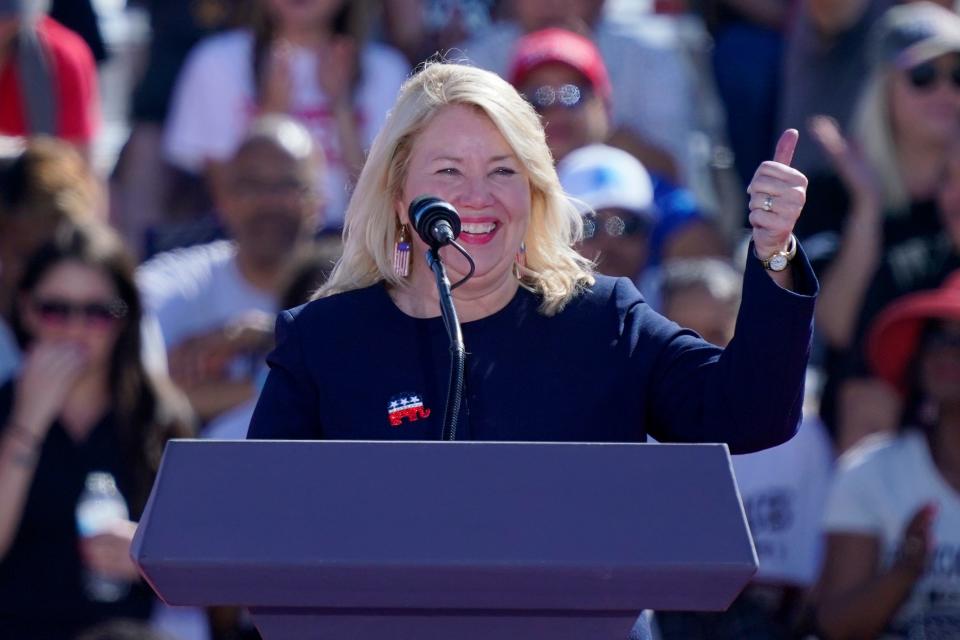If there’s a border crisis, why kill a bipartisan deal? AZ Republicans explain their opposition
- Oops!Something went wrong.Please try again later.
Arizona’s Republican members of Congress have for years demanded a plan to address illegal migration at the U.S.-Mexico border.
When one came across their desks last week, they rejected it.
The House’s GOP contingent has over the past two weeks rejected a bipartisan border deal, with leadership declaring it “dead on arrival” in the Republican-controlled lower chamber and has instead put their political energy behind a measure impeaching the Homeland Security secretary, a constitutionally dubious move that is doomed in the Senate.
With legislative oxygen in short supply in an election year, Republicans’ approach makes it unlikely Congress will enact far-reaching immigration reform. And it has raised questions about the party’s commitment to making concrete progress on an issue that has become central to their campaigns and public messaging.
It's led Tom Wong, a political science professor and director of the University of California — San Diego’s U.S. Immigration Policy Center, to a cynical conclusion: "What we’re seeing is that many politicians would rather complain about the issue than do the difficult work of solving the issue."

The negotiations came into public view in early February, when a group of senators, led in part by Sen. Kyrsten Sinema, I-Ariz., unveiled what had until then seemed a remote possibility: a sweeping border bill supported by lawmakers in both parties.
Crafted by a bipartisan group in the Senate, the deal included several policy concessions to GOP members hoping to crack down on illegal immigration. Among other provisions, the deal would have scaled back the practice of releasing migrants into the U.S. as they await a court date, raised the bar for migrants to qualify for asylum, and created a new authority for the president to shut down the asylum processing system if illegal crossings reach a certain level of traffic.
But the deal didn’t resonate with Republican border hawks. Former President Donald Trump blasted the bill on social media, killing its momentum. All of Arizona’s Republican House members came out against the measure, except for Rep. David Schweikert, R-Ariz., who stayed silent on the proposal.
The bill failed to advance in the Senate, with some Republicans turning against the proposal they had been working to pass just days before.
“The last few weeks have affirmed Trump’s hold on the Republican Party, and re-affirmed the importance that immigration is going to play in the upcoming election,” Wong said.

In an interview, Rep. Juan Ciscomani, R-Ariz., disputed the idea that Trump’s position played any role in his decision to oppose the bill. Ciscomani said he opposed the deal because it didn’t go far enough.
“The situation has gotten way too (far) into a crisis for us to be OK with getting one-fourth of the way there,” said Ciscomani said, who has successfully worked on several smaller, bipartisan bills that reform immigration policy in what he calls a “piecemeal” fashion.
At the core of Republicans’ public opposition to the bill is the provision that would allow the president to turn away most asylum seekers whenever there’s an average of 4,000 daily encounters with migrants for a week in between ports of entry.
If there are 5,000 daily encounters on average, or 8,500 in just one day, the U.S. would be required to take that step.
The provision amounts to a new restriction in the U.S. asylum system, but Republicans still rejected it as being too permissive.

Rep. Debbie Lesko, R-Ariz., wrote in a statement to The Arizona Republic that the new presidential authority “would weaken border security” by allowing migrants into the country and “giving them work permits,” likely a reference to the new work visas provided for in the bill. Her office did not respond to follow-up questions.
Pressed on whether the bill would be an improvement from the status quo, Ciscomani said it sends the wrong message.
“This bill doesn’t deal with the main issue, which is sending the message to everyone around the world that if they continue to come, they’ll continue to be allowed in," he said.
Ciscomani has said that he and other colleagues met with Sinema during the negotiations over the Senate bill and “were clear” about what they needed to support the bill.
Ciscomani, a House freshman, declined to share what exactly he asked for in those meetings, but said the final deal didn’t invest enough in “stopping the flow” of migrants through measures like the Trump-era “Remain in Mexico” policy and the Republican-led H.R. 2, a bill that would codify some of the former president's strictest policies. Democrats oppose both.
Lesko likewise placed the onus on Democrats, writing in a statement that House Republicans were “stalwart defenders” of the border and passed H.R. 2 last year.
“The Senate instead ignored this proposal and concocted a so-called compromise bill,” Lesko wrote.
Rather than engage with the Senate bill, House Republicans have trained their sights on impeaching Homeland Security Secretary Alejandro Mayorkas.
The impeachment resolution, which passed the House on the second try by a margin of just one vote, argues that Mayorkas lied to the American public by saying that the border was secure, and that he violated existing immigration laws by enforcing Biden’s border policies. Arizona's Republican Reps. Eli Crane and Andy Biggs have played key roles in that effort.
The effort was constitutionally questionable. Legal scholars from across the political spectrum argued the allegations against Mayorkas were policy disagreements that didn’t meet the threshold of “high crimes and misdemeanors.”
It’s also unlikely to actually push Mayorkas out of office. Convicting the agency chief would require a two-thirds vote in the Senate, where Democrats are in the majority.
“It is an opportunity for Republicans to be on the record to appear, quote-unquote, ‘tough on the border,’” Wong argued. “All this was, really, was an opportunity for Republicans to appear as though they are trying to act on the issue. But the impeachment process is appearing tough in a very shallow way.”
Ciscomani defended the effort, as well as his own vote to impeach Mayorkas.
“It’s always the best use of the House’s time and energy to hold anyone accountable. And I’ve done that,” Ciscomani said.
Laura Gersony covers national politics for the Arizona Republic. Contact her at lgersony@gannett.com or 480-372-0389.
This article originally appeared on Arizona Republic: Border bill: Why did Arizona's House Republicans oppose Senate deal?

